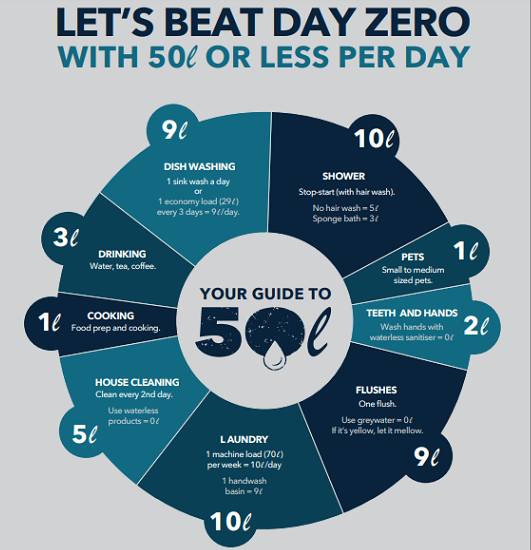Cape Town pushes Day Zero for water consumption back to 2019
- April 3, 2018
- Posted by: administrator
- Category: Environmental, Africa

The City of Cape Town has managed to push back Day Zero, the day when almost all of the taps in the city will be turned off and residents have to queue for water at approximately 200 sites across the peninsula, to 2019, according to the water dashboard which keeps track of efforts to avoid reaching it.
The City is continuing with its drive to get down to the required 450 million litres of collective daily water usage, or 50 litres per person per day needed in order to stretch the available water supplies through the rest of the year.
As at Monday 26 March 2018, collective consumption over the past week was 522 million litres of water per day. This is 43 million litres lower than the previous week’s usage.
The more water the city’s inhabitants use, the faster dam levels decline. In the past week, dam levels have fallen by a further 0.5% to 22.2% despite recent rainfall.
A statement issued by the City said that although the winter months were likely to bring more rain, it could not estimate how much rain it would have or count on it having a significant impact on our dam levels.
The City is continuing to implement a number of measures to reduce water consumption. Water management devices continue to be installed on the connections of high water users and teams are working around the clock to detect and repair leaks.
Current water restrictions remain in place whereby consumers are receiving bills based on tariffs which means the more water that residents use, the more they will pay.
The City has also been expanding its roll-out of pressure testing with the purpose of using the results to implement more automated pressure zones across the metro in an effort to help reduce water usage to 50 litres per person per day.
By creating automated pressure zones, the City said it is able to adjust water pressure remotely and work more efficiently as it implements pressure management. The technology reduces the pressure of the flow of water and thus helps to reduce water usage.
However, while Day Zero has been deferred for the time being, subject to Team Cape Town’s efforts to continue lowering water usage, the City’s emergency preparedness planning is continuing to ensure readiness in the event that dams reach critical levels and forces the shutdown of the network to individual properties.
The City’s Disaster Risk Management Centre (DRMC) conducted an exercise at the end of March to test the vehicle drive-through configuration of the planned points of water distribution (PODs).
The DRMC has been working to ensure that the PODs can be effectively managed. This involves anticipating what strategies households and businesses will employ to meet their water needs in the event of Day Zero and how these strategies can be supported by designing and managing the PODs in a way that ensures water collection can be made quickly and safely.
The aim of the exercise was to test different layouts to see which configuration is most efficient and safe; to collect data on how long it will take to fill containers; and to assess staffing and other operational requirements.
The exercise will further evaluate the impact of potential traffic congestion on the on-site operations and the surrounding area.
